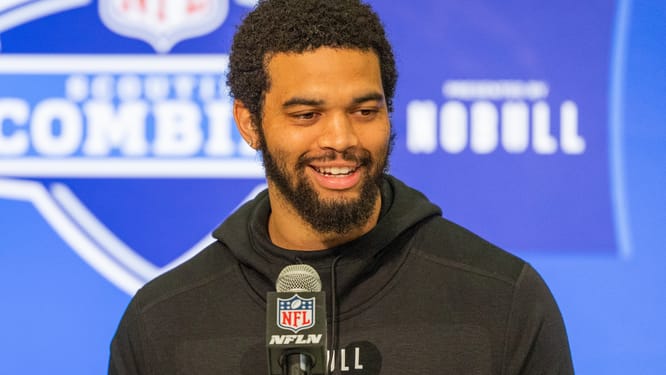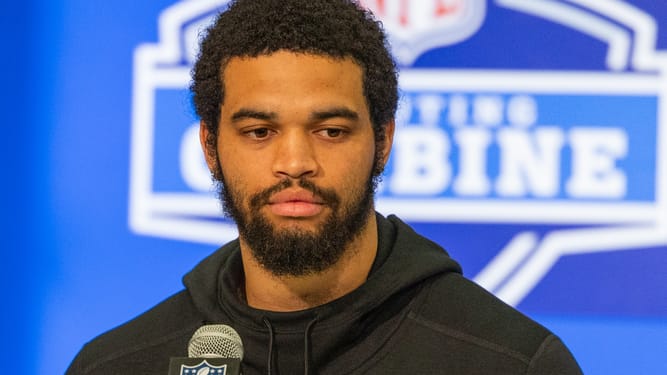
With the money and attention of the world that comes with playing in the NFL, every action taken by a prospect undergoes intense scrutiny. Today, the scrutiny is focused on former USC quarterback Caleb Williams, the Heisman Trophy winner and presumed first overall pick in April’s NFL Draft. While speaking to the NFL Combine in Indianapolis on Friday, Williams made headlines not for his performance or for the answers to the throngs of media present, but for his choice to skip event’s medical examinations. As expected this has created a firestorm of concern and criticism in the media and with some analysts who see it as a red flag.
But is it really a red flag? Or is this just selective outrage over a player who is just looking out for himself?
Caleb Williams is first player to refuse medical exams at NFL Combine

Caleb Williams’ move is unprecedented as he’s the first player to attend the combine and skip the customary medical exams. This unconventional decision has generated reactions from surprise, consternation to admiration about his decision. Yet, from a business point of view, it appears that Williams’ choice is strategic in a field where negotiation power holds weight. He’s holding all the cards, and flexing that muscle shouldn’t be a surprise, nor should it outrage anyone.
For the casual observer, or writer or video creator new on the beat, the NFL Combine medical exams have always been a polarizing subject for players and their agents.
The length of these exams, repetition found in them and the intrusiveness of them has not made players happy over the years. Hundreds of prospects have expressed their worries about the examinations conducted by doctors from all 32 teams often enduring the tests and fielding similar inquiries repeatedly. In light of this reality, and with no reform from the NFL despite the concerns, Williams’ choice to abstain from this aspect of the combine is not a personal decision but a statement that mirrors a growing sentiment among players for a more streamlined and respectful evaluation process.
Criticizing Caleb Williams for using his leverage is peak hypocrisy

With his level of influence as the expected No. 1 draft pick, Williams’ undeniable talent and potential on the field means he can do things his way. His decision to forego on-field testing at the combine is mirroring trends among quarterbacks over the past several years. Williams has confidence the decisions he has made around the NFL Combine will not, in any way, hurt his draft stock or squash the enthusiasm teams have for his potential as a pro. This unprecedented leverage empowers Williams to set the conditions by which he will engage with the league’s teams.
Detractors of Williams’ choice may argue that it establishes a precedent that could potentially impact his draft position negatively or suggests he is unwilling to be forthcoming about anything, and that should concern teams who are interested in him. These criticisms overlook the evolving landscape of both the NFL and its draft process. In todays age of athletes having more hands-on control over their careers, and public image, Williams’ decision reflects a trend that will only grow. He is prioritizing his health and well-being over the draft rituals that have typically been a part of the process.
The critics who claim the NFL Combine’s medical exams are vital ignore that Williams will undergo medical exams on a team-by-team basis. This reduces the repetitiveness of the NFL Combine’s system and allows the young player to discuss his medical information with teams only serious about drafting him. This compromise allows teams to assess his health without the spectacle combine’s process. This approach not only respects Williams’ independence, but it also aligns with the NFL’s recent efforts to make the pre-draft process more player-centric.
Caleb Williams’ choice to skip evaluations at the NFL Combine shouldn’t come as a surprise. The media reaction to it has been overblown, unfair, and petty. At a time when players rights and their desire to have more control over their careers is front and center, an athlete using his leverage to navigate the pre-draft process on his own terms is admirable. It underscores how power dynamics in sports are evolving with players exerting influence over organizations and taking charge (to the degree they can) of their own career.
Williams’ draft stock is unlikely to diminish because ultimately talent speaks for itself. Whether you agree or not, he’s the hottest commodity at the NFL Combine, and he’s still going to be the first overall pick, no matter what anyone thinks.